History
ORT was founded in 1880 in St. Petersburg, Russia, with the aim of supporting the struggling Jewish population by helping them acquire skills that would allow them to achieve economic independence.
During its development, which spanned revolutions and wars, ORT has repeatedly proven its ability to adapt to change.
Few organizations can pride themselves on having achieved such an active, significant and consistent presence for so many years.
Many things may have changed over the years, but fortunately many things have also remained. In order to understand the current structure of ORT, it is useful to review the historical development of the organization in the context of the country.
ORT provides quality education and training in line with current job market needs in every country where it has a presence.
Activities at ORT Uruguay in the 1940s
In Uruguay
In Montevideo, ORT Uruguay became part of the network formed by World ORT.
The organization was founded in 1942 by members of the Jewish community wishing to support the waves of immigrants escaping Nazi horrors, by teaching them trades that would ease their social integration into the economy and citizenship of the country.
From the 1950s through the 1970s, ORT Uruguay strengthened and expanded its educational offering to society in general. It also began to specialize in advanced technologies, such as electronics, training the technicians and professionals that the country needed.
The decades of 1980 and 1990
During the 1980s ORT Uruguay grew quickly, transforming into one of the leading organizations training technicians in electronics, telecommunications and informatics.
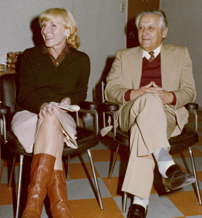 The growth of the student body was accompanied by a significant development of the university's facilities and the incorporation of new technology.
The growth of the student body was accompanied by a significant development of the university's facilities and the incorporation of new technology.
Bernard Wand-Polak
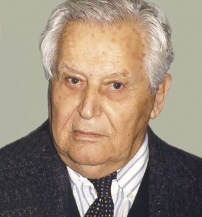 In 1989 the then-named ORT Technological Institute was the largest non-governmental organization focused on technology education in Uruguay.
In 1989 the then-named ORT Technological Institute was the largest non-governmental organization focused on technology education in Uruguay.
It offered dozens of short degree programs in the areas of management and technology, promising quick job placement for young people and fulfilling a need in Uruguayan society.
Engineer Bernard Wand-Polak was the director of World ORT in Latin America in the 1970s and 1980s.
His vision for the organization was ahead of its time; he believed information technology and electronics would have an essential role in the development of countries and their education systems.
Under his leadership, ORT computing centers were created in Argentina, Brazil, Chile and Uruguay.
Tertiary education
In 1985, ORT requested official recognition for its Systems Analysis and Electronics degrees from the Ministry of Education and Culture.
These degrees were taught within various departments in the institution, which were consolidated in 1996 into what is now the Faculty of Engineering, carrying the name Bernard Wand-Polak.
The official recognition of the Systems Analyst degree in 1988 constitutes the first tertiary authorization given by the Uruguayan state to a non-governmental educational institution.
In the 1980s, ORT Uruguay decided to widen and diversify its education programs in accordance with the needs of Uruguayan society at the time.
In 1988 the School of Management was created, as the first business school in the country. It is important to note that in the 1980s, ORT Uruguay was perceived by Uruguayan society to be a tertiary institution in terms of resources, size, teaching staff, graduates and study programs before obtaining official university status from the Ministry of Education and Culture.
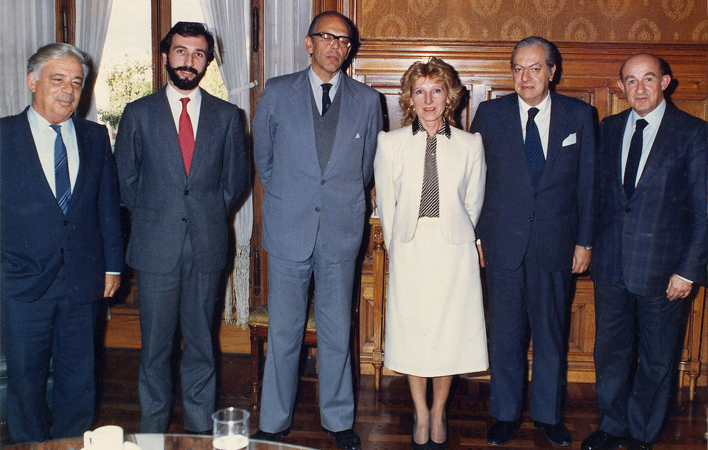
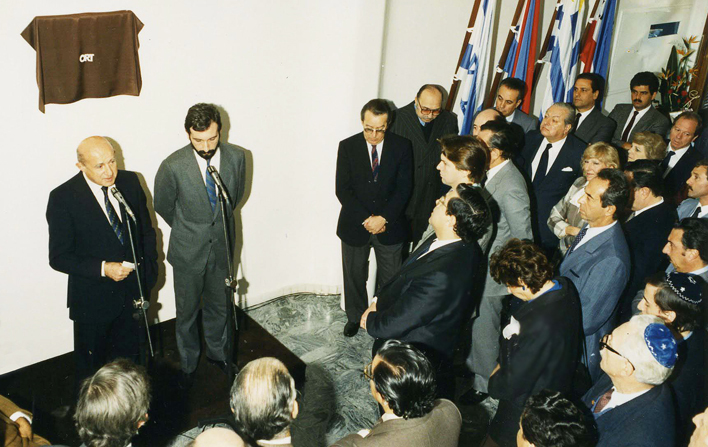
ORT's accreditation as a university by the Ministry of Education and Culture resulted from many years of hard work.
Recognition as a university
In 1995, through Decree 308/95 of the 11th of August, the government established a legal framework for private universities in the country.
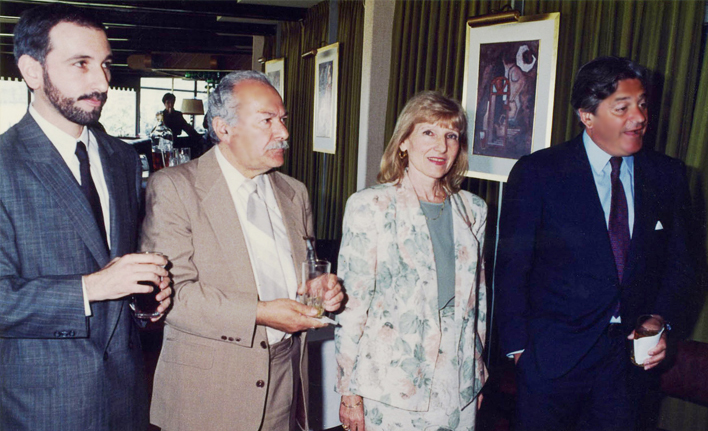
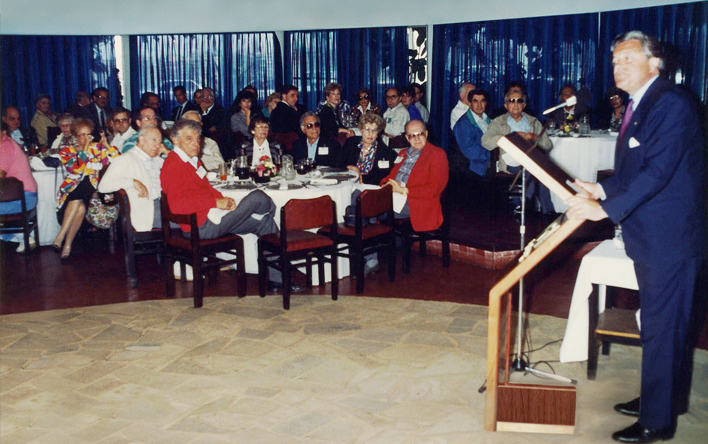
In February of 1996, ORT Uruguay was the first institution to request authorization to function as a private university, an accreditation that was awarded in September of the same year.
Thus, ORT Uruguay was the first institution recognized as a private university in the country under the new legal framework, and thereby became Universidad ORT Uruguay.
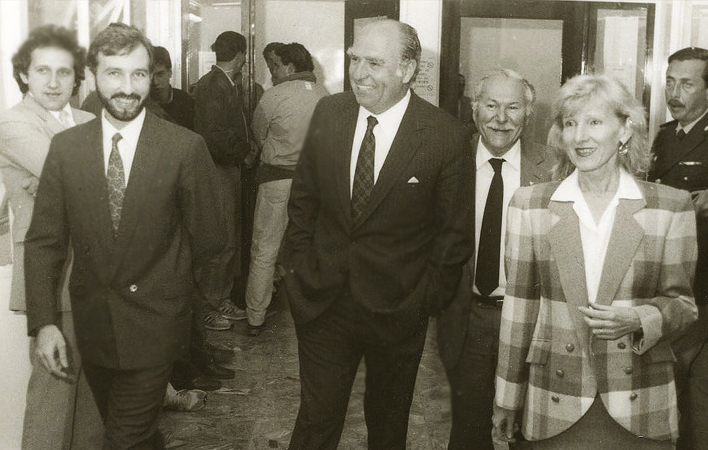
Widening the educational scope
The Faculty of Communication and Design pioneered university-level design degrees in the country. ORT Uruguay created the first private tertiary degree in design in the country in 1995, which was recognized as a university-level degree in September of 1996.
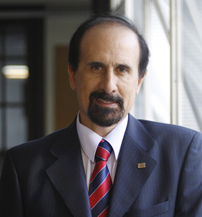 Later, upon recognition as a university, two new academic units were created: the Institute of Education (1998) and the Faculty of Architecture (1999).
Later, upon recognition as a university, two new academic units were created: the Institute of Education (1998) and the Faculty of Architecture (1999).
These departments joined the already existing Faculty of Engineering, Faculty of Management and Social Sciences, and Faculty of Communication and Design.
Currently, the Faculty of Engineering offers seven university-level degrees in engineering, in the areas of computer science and systems, electronics, electrical and telecommunications engineering, and biotechnology.
This last area was added in 2010, after achieving support through an open competition called by the National Agency of Research and Innovation, and after having created a specialized laboratory for the field.
This new degree, which quickly obtained national recognition, fosters research and development collaboration with industry.
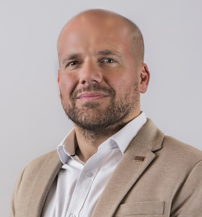 In 2017 the new 300 m2 biotechnology laboratory was inaugurated, complete with type 1 and 2 biosecurity rooms, fermentation rooms, protein purification equipment, washing stations and material prep stations, and common areas for Analysis and Molecular Biology.
In 2017 the new 300 m2 biotechnology laboratory was inaugurated, complete with type 1 and 2 biosecurity rooms, fermentation rooms, protein purification equipment, washing stations and material prep stations, and common areas for Analysis and Molecular Biology.
At the end of 2013, the Faculty of Engineering developed SM4T, the country's first Massive Open Online Course (MOOC) oriented to teenagers learning to program.
The course was piloted with 1,290 student participants. SM4T was a joint initiative between Universidad ORT Uruguay and Plan Ceibal.
Based on SM4T, ¡A programar! was developed for Coursera, with an English version (Code Yourself) made in collaboration with the University of Edinburgh. In 2017 this course, offered in English and Spanish, reached 200,000 users within a year and a half of publication, with an average of 920 users per week. It is one of the most popular courses in Spanish on the Coursera website, and for a few months in 2016-2017, it was in first place overall on the platform.
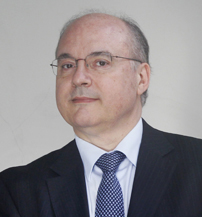 The School of Management, as it was called, transformed into the Faculty of Management and Social Sciences. Its Masters in Business Administration was classified in 2017 for the 21st year running as one of the best in Latin America according to the annually published journal América Economía.
The School of Management, as it was called, transformed into the Faculty of Management and Social Sciences. Its Masters in Business Administration was classified in 2017 for the 21st year running as one of the best in Latin America according to the annually published journal América Economía.
Degrees are offered in Business Management, Economics, Accounting, and International Studies, along with a wide range of postgraduate degrees and executive training programs.
The Faculty of Communication and Design operates in two Schools, one that offers degrees in Design and the other in Communication. Activity in the field of Communication began in 1996, with degrees in Journalism, Audiovisual Production, and Advertising.
Currently, this faculty offers an undergraduate degree in Communication with 4 specializations: Audiovisual, Digital Content, Journalism, and Advertising and Marketing, as well as a degree in Business Communication.
In 2008, the faculty signed a framework agreement of collaboration with California Institute of the Arts (CalArts), in the United States, that served to back the launch of the degree in Animation and Video Games (2010). This is the only university degree in the area offered in Uruguay.
In 2018 another pioneering degree in the faculty was launched, the degree in Design, Art and Technology.
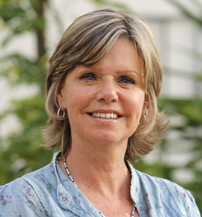 The Institute of Education was established in 1996 with the first offering of postgraduate degrees in the field of Education and thus began a relationship of academic collaboration with Harvard University School of Education.
The Institute of Education was established in 1996 with the first offering of postgraduate degrees in the field of Education and thus began a relationship of academic collaboration with Harvard University School of Education.
The Training Center for Teaching in Higher Education is part of the Institute of Education. Its mission is to foster continual improvement in teaching quality through support services and professional training for teachers, both within the university and outside of it.
In July of 2012, the Institute began teaching the first Doctorate in Education in Uruguay. This advanced postgraduate degree, recognized by the Ministry of Education and Culture in 2014, integrates an international network of researchers who focus their activities on issues relevant to educators in Uruguay.
Students from various Latin American countries are pursuing the Doctorate. To date, 5 doctoral degrees have been awarded to graduates of this program (March 2018).
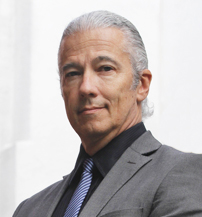 In April 2017 the first edition of the Master in Training of Trainers began. This postgraduate degree, unique in the country, provides a space for the development of such skills as planning, implementation and evaluation of education in its many forms, both in the formal education system and in informal settings.
In April 2017 the first edition of the Master in Training of Trainers began. This postgraduate degree, unique in the country, provides a space for the development of such skills as planning, implementation and evaluation of education in its many forms, both in the formal education system and in informal settings.
The Faculty of Architecture emerged in 1999 with the mission of offering university degrees in Architecture and Interior Design, as well as diplomas and short degree programs in related fields.
Universidad ORT Uruguay is currently the only private university that awards an officially-recognized Architect degree, with its corresponding professional competencies and responsibilities.
External activities and trajectory
Since its beginnings, ORT Uruguay has been active in educational research. Following this direction, experimental projects are developed in the field of educational technology, some of which have been recognized nationally and internationally.
Dr. Jorge Grünberg, rector of the university, received the National Technology Prize in 1980 and the Silver Central Regional Prize for Teaching in Technology in Spain in 1984 for his work in the area.
ORT has supported various schools in Montevideo through its extracurricular programs in Creative Education in primary school and Information Technology in secondary school.
Assistance included providing the logistic and academic conditions for creating the first computer labs in secondary schools. Today, Universidad ORT Uruguay certifies infotech courses in 14 private schools, including the Network of Jewish Schools in Montevideo, through its Infotech Knowledge Certification Program.
Jewish studies
In 2003, the Department of Jewish Studies was created with the aim to revitalize and widen the contribution to the area, which had existed in ORT Uruguay since its founding in 1942.
Its mission is to share Jewish culture and history through the publication of books, production of films and documentaries, and participation in conferences and expositions linked to the subject. Among these activities there is a course called 'Shoá: the human condition and memory', which was declared of educational interest by the Ministry of Education and Culture in its sixth edition, through Ministry Resolution 0514/2017.
Since 1982 the university edits and publishes annually the 'Ioman ORT' for Rosh Hashanah (Jewish new year), an almanac which celebrates events and people relevant to the Jewish world. The almanac is distributed free of charge.
International cooperation
Since the 1980s, ORT Uruguay has participated in academic cooperation activities with universities in other countries.
It is a member of main international academic associations, such as the International Association of Universities, and the Association of Universities of Latin America and the Caribbean.
Academic cooperation agreements are maintained with more than 170 academic institutions in Latin America, North America, Europe, Australia, China, South Korea, India and Israel. These agreements allow academic exchange between teachers and students, and facilitate collaborative activities.
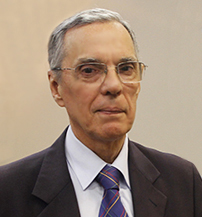 In 2004 the University created the Student Exchange Office, dedicated to bilateral exchange agreements, through which more than 100 students from all over the world come to ORT each year. One example of these programs is the partnership with Harbin Normal University (HNU) in China, which initiated in 2009.
In 2004 the University created the Student Exchange Office, dedicated to bilateral exchange agreements, through which more than 100 students from all over the world come to ORT each year. One example of these programs is the partnership with Harbin Normal University (HNU) in China, which initiated in 2009.
The Chinese students take the third year of their four-year degree at ORT, within a Joint Spanish Program developed by ORT and HNU. They also take courses within regular degree programs, along with local and international students from other countries.
42 Chinese students arrived in Uruguay in September 2012; they were the first generation of students in an exchange program between a Uruguayan and a Chinese university.
International accreditation
As part of its quality assurance policy, the university has performed a variety of self-assessments for its degree programs since the year 2000. Additionally, in the framework of its partners’ network and its academic strengthening and consolidation activities, Universidad ORT Uruguay has hosted international partners performing evaluation visits.
The university encourages administrative and academic staff to participate in accreditation and quality assurance processes, especially at the regional level.
In 2005, the undergraduate degrees of Electronic Engineering and Telecommunications Engineering were accredited by Mercosur, through the Experimental Mechanism of Degree Accreditation (MEXA for its Spanish abbreviation), for the maximum period of 6 years.
The accreditation was renewed in 2011, through the ARCU-SUR system that had replaced MEXA in 2006. The undergraduate degree in Architecture was also accredited by ARCU-SUR in 2009 for the maximum period. This accreditation was renewed in 2016.
These undergraduate programs had their academic quality certified through the regional accreditation system ARCU-SUR. ARCU-SUR is operated by a network of the government accreditation agencies of Argentina, Bolivia, Brazil, Chile, Colombia, Paraguay, Uruguay and Venezuela, and continually incorporates new degree programs.
ORT Uruguay has submitted each of its degrees for accreditation, as soon as the network of agencies made available accreditation for the degree’s academic field.
In January 2013 the Master in Business Administration - MBA was accredited by the Association of MBAs (AMBA), an international authority in postgraduate-level management education which is dedicated to the quality certification of MBA and Doctorate in Business Administration programs.
This accreditation places our MBA among the 6% of accredited Master’s degrees in management in the world. The AMBA accreditation was renewed in 2017.
Faculty
The academic staff is made up of more than 1,400 professors and researchers, many of whom work full time and hold graduate degrees, including 158 Ph.D. and doctoral degrees.
Research
Universidad ORT Uruguay conducts research in each of its faculties, with an applied focus. Research is carried out in close contact with companies and research centers and encourages student participation.
Academic contributions take the form of articles in academic journals, presentations, technical and scientific conferences, books and book chapters, and also results that are transferred to industry in different ways. In 2016, ORT´s academic cluster produced 166 publications, considering all the academic departments.
In 2016 a Technology Center was opened for joint work with the biotechnology industry. The center was funded by the National Research and Innovation Agency (ANII) in a competitive call. The Center´s objectives include contributions through research for new products and services design -- including bioprocesses design-- as well as updating analytic and diagnostic tools, creating genetically modified organisms, and exploring different aspects of protein chemistry and nanotechnology applications.
Support for graduates and entrepreneurs
In cooperation with the Technology Laboratory of Uruguay (LATU) and with the support of the Inter-American Development Bank (IABD) in 2001 Universidad ORT Uruguay launched the first business incubator in the country: Ingenio. It was aimed at entrepreneurs and emerging telecommunication and information systems companies.
Based on this experience, in 2009 the Center for Innovation and Entrepreneurship (CIE) at Universidad ORT Uruguay was set up. CIE promotes and develops new generations of entrepreneurs. It promotes innovation and entrepreneurial attitudes among students as well as seizing opportunities and strengthening the links between entrepreneurs and the academic and production sectors.
Students and graduates receive job placement support-- graduate employability is over 95%-- as well as support setting up their businesses, which are often based on students` final projects. Thousands of graduates excel in their career paths, many in their own companies.
Sports & social activities
The Sport and Social Activities Center organizes recreational opportunities for students and provides the required infrastructure for training in order to represent the university in local and international sporting events.
The university regularly competes in the following sport disciplines:
- Basketball
- Basketball (+35)
- Futsal (male and female)
- Handball
- Hockey
- Volleyball (male and female)
Students and graduates from all faculties participate in games and enter tournaments within the university.
Students who wish to be on competitive teams must sign up for the season in order to participate. During the off-season, activities are organized for students, teachers and university staff.
Extension activities
The Mother and Child Program and a Productive Training program were created in 1988 and benefited over 20,000 people while they were run by ORT Uruguay. Their influence continues today, now that these centers are self-managed, a key aim of the project to ensure its continuity.
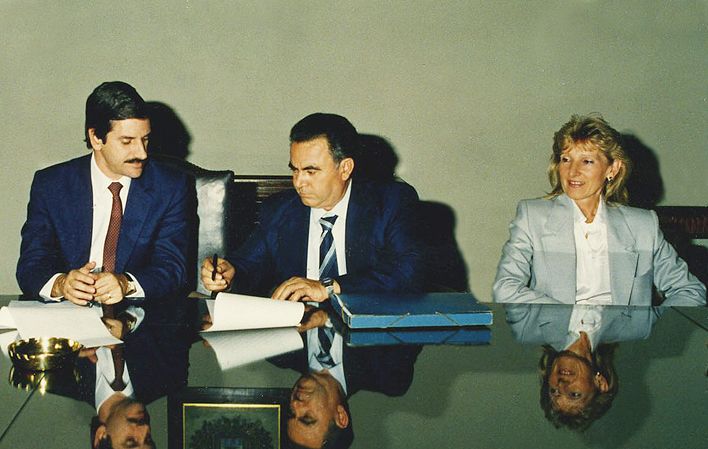
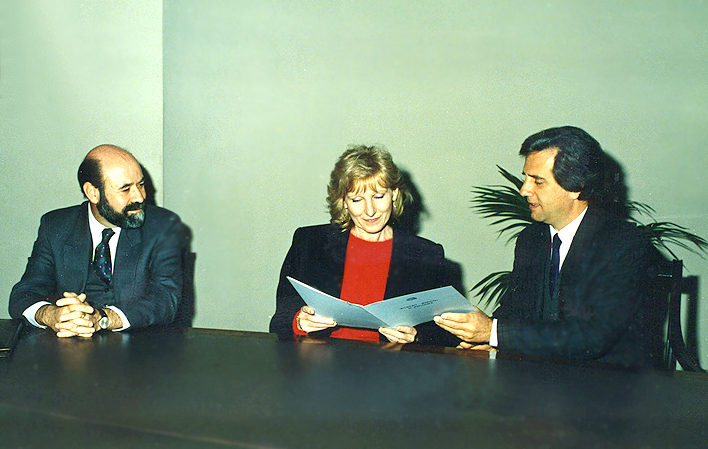
The signing of the first agreement with the Municipal Government of Montevideo: Julio Iglesias, the City Mayor at that time, Dr. Fernando Scrigna, Secretary General of the Municipal Government of Montevideo, and Prof. Charlotte de Grünberg, General Director of ORT Uruguay.
Among the university´s extension activities, the Integrated Social Action Project stands out.
This project was designed and implemented by ORT Uruguay under an agreement with the Municipal Government of Montevideo and financed by international organizations such as the European Union and the Canadian International Development Agency (CIDA).
The administrative committees that emerged from the community, were trained by ORT and supported by the local governmental authorities, now successfully manage the centers.
Each center continues to function, although now autonomously.
Infrastructure
Two specialized libraries with over 100,000 volumes are available to students and teachers.
They also have access to thousands of journals, e-books, thesis documents, and articles in diverse knowledge areas, made available through the university's subscriptions to major bibliographic databases around the world, or through the national portal Timbó.
Also available are reading or conference rooms and WiFi coverage.
The technology infrastructure for academic support includes:
- Over 1,200 state-of-the-art computers connected to high-speed Internet.
- Electronic and telecommunications laboratories.
- TV and radio studios with HD cameras.
- Control rooms and post-production equipment [MdCA1]
- Laboratories for prototype design and construction
- Biotechnology laboratories
Universidad ORT Uruguay was the first institution in the country to adopt digital technology for professional production and broadcast in multimedia formats.
In 2012 the university was chosen by the National Research and Innovation Agency (ANII) in a competitive call that made possible the 3D Prototyping Lab, inaugurated in June 2013.
The laboratory was the first of its kind in the country and complements other equipment in the School of Design for metalwork, woodwork, and work with plastics and textiles.
In 2017 a second laboratory was inaugurated and became the first Biotechnology Center in Uruguay. The Research and Innovation Biotechnology Center (CBI+I) was selected in a competition for funding, launched by the National Research and Innovation Agency (ANII), along with other Technology Service Centers from different sectors.
The aim of CBI+I is to promote collaboration between business and public and private institutions which create and demand knowledge, giving new scientists the opportunity to take part in research projects that are directly linked to industry.
Downtown campus (photo gallery)
Pocitos campus (photo gallery)
Looking to the future
Remaining true to its historical roots of providing educational opportunities with a basis in social justice, ORT Uruguay funds a scholarship program that benefits over 4.400 students. This program supports a diverse and inclusive approach in which students from different socioeconomic backgrounds and different parts of the country come together.
It is a forward-thinking organization as far as methodological innovation for teaching and learning goes, making use of new technologies while giving thoughtful attention to those educationally, socially and economically underprivileged.
With over 10,000 students across four faculties and one institute, the university offers 62 different vocational, undergraduate and graduate degrees in the areas of architecture, engineering, biotechnology, management, economics, international relations, design, animation, communication, and education.
In a world in which careers are constantly evolving, some professions disappear and others emerge at a rapid pace, Universidad ORT Uruguay, now as ever, strives for its students´ success and invests all of its resources to achieve this goal.
Many people have contributed to ORT´s development. Volunteers and professionals have devoted their time, resources, attention, and unswerving commitment to make ORT in Uruguay the great organization it is today.
It is a remarkable and compelling story which is both a huge opportunity and a challenge for the future.
https://www.youtube.com/watch?v=AV3uIVRzB4g




